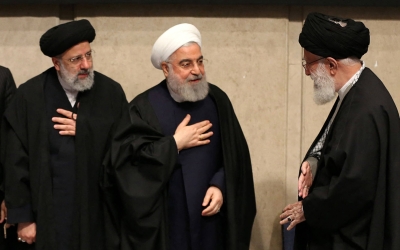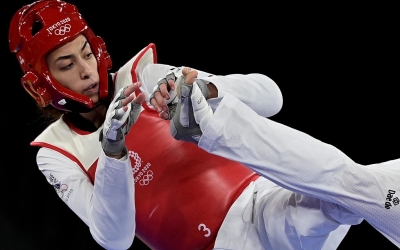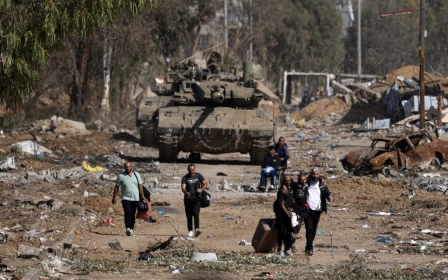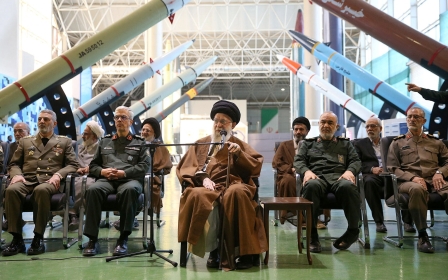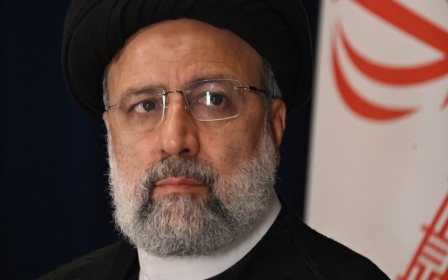Iranian press review: 'Prepare your coffins', reads Tehran propaganda mural in Hebrew
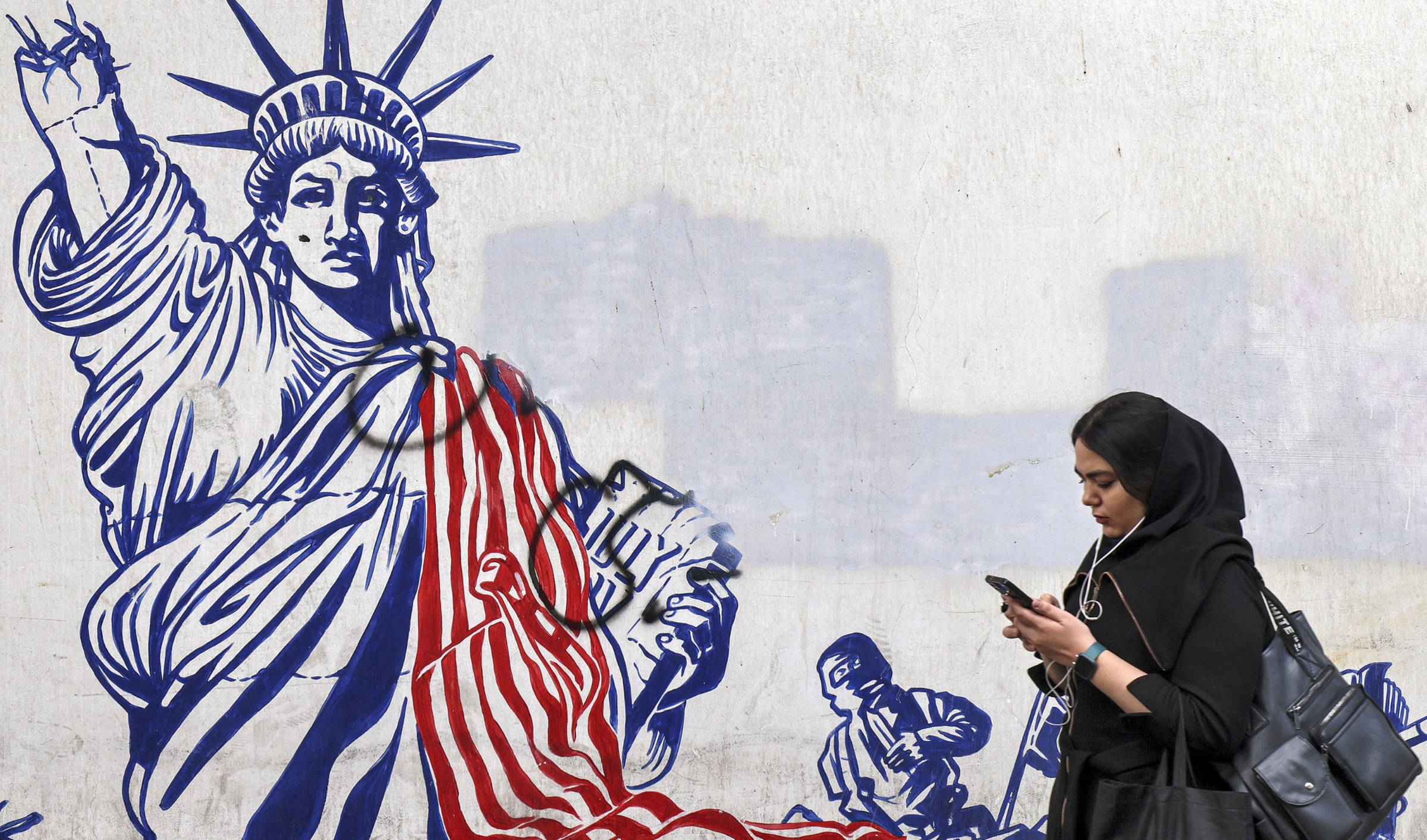
IRGC threatens Israel through mural diplomacy
On the same day that the residents of Iran's capital, Tehran, woke up to news of the Islamic Revolutionary Guard Corps (IRGC) attacking targets in Iraq’s northern Kurdistan region, an enormous propaganda mural appeared in the central Palestine Square.
The mural displayed six missiles launched in the sky, with writing in Hebrew and Farsi that reads "Prepare your coffins."
On Tuesday, the Mehr news agency, closely tied to the establishment, reported that the new mural was erected to propagate the message of the IRGC’s latest missile attack on Kurdistan.
New MEE newsletter: Jerusalem Dispatch
Sign up to get the latest insights and analysis on Israel-Palestine, alongside Turkey Unpacked and other MEE newsletters
In four separate statements, published minutes apart, the IRGC claimed the attacks were a response to the killing of its top commander in Syria, asserting that the "espionage centres" of the Israeli intelligence service were targeted.
At the same time, the IRGC struck another target in Syria, claiming it was the headquarters of the Islamic State (IS), adding that it was targeted in response to the IS terrorist attack in the Iranian city of Kerman on 3 January.
Meanwhile, the Fars news agency, affiliated with the IRGC, released a video in which IRGC Aerospace Force commander Amir Ali Hajizadeh provided more details about the strikes.
In the video, Hajizadeh mentioned that 24 ballistic missiles were fired from the Iranian provinces of Kermanshah, Khuzestan and East Azerbaijan at targets in Iraq and Syria.
On Tuesday night, Fars reported that the IRGC targeted two military centres of Baluch armed groups in Pakistan with drones and ballistic missiles.
Islamabad said the strikes killed two children and denounced the attack as a "violation of international law".
On Thursday, Pakistan launched retaliatory air strikes on Iran's Sistan and Baluchestan province, reportedly killing at least nine people.
Iranian state media reported that three women and four children, all of whom were non-Iranian, were among the nine people killed.
Rafsanjani’s daughter stirs political plot
The daughter of Ali Akbar Hashemi Rafsanjani, a key founder of the Islamic establishment in Iran, has cast doubt on her father's reported heart attack as the cause of death, revealing intriguing details.
On the seventh anniversary of Rafsanjani’s passing, his elder daughter, Fatemeh, revealed in an interview with the Etemad daily that two months prior to his death, two individuals approached her, warning of a plot within the establishment to kill her father.
“They informed me that there were plans to eliminate my father, suggesting it would be made to appear as a natural death,” she disclosed to Etemad.
Rafsanjani, once the leading aide to Ayatollah Ruhollah Khomeini, played a crucial role in securing power in Iran, overseeing the execution and imprisonment of nationalist leftist revolutionaries. Following Khomeini’s death in June 1989, Rafsanjani was instrumental in establishing Ayatollah Ali Khamenei as the country’s supreme leader.
In the early 2000s, a power struggle separated the two former allies, leading Rafsanjani to align with reformists advocating reducing the power of the supreme leader.
Until his death in January 2017, Rafsanjani, who had a heart attack in a swimming pool, remained a powerful figure as the chairman of the Expediency Discernment Council.
In the recent interview, Rafsanjani’s daughter suggested that rival factions in the establishment feared her father might reclaim power if the supreme leader predeceased him.
She also said that intelligence services rejected the family's request to review CCTV footage from his office at the Expediency Discernment Council and the swimming pool where he died.
Shortage of children's hospital beds
A severe shortage of children's hospital beds across Iranian cities has compelled many parents seeking healthcare for their children to travel to the capital, Tehran, only to find hospitals rejecting their requests for admission.
In a report from several hospitals in Tehran, the Ham Mihan daily paints a grim picture of parents waiting for hours in line to have their children examined by a doctor.
On Monday, the daily highlighted the story of a 17-month-old baby diagnosed with a viral disease. The parents had to visit 15 hospitals and health centres before finally finding an available bed to hospitalise their child.
The report revealed that in one of Tehran's hospitals, a father had to hold his child, who had diarrhoea and was vomiting, for 24 hours in his arms inside the emergency ward until the hospital admitted the sick child.
According to the daily, the primary reasons behind the situation are a lack of doctors and nurses, caused by widespread emigration of health professionals, coupled with a lack of resources amid a worsening economic crisis.
Reza Shervin, head of the Tehran Children's Medical Centre, told the daily that the situation is alarming in the country, because there are not enough children's hospitals.
"The problem is not only beds; we do not have enough doctors and nurses. We need to create more motivation for forces such as specialised nurses in children's hospitals," he said.
Other experts who spoke with the daily added that Rotaviruses, a common cause of diarrhoeal disease among infants and young children, have been the main contributors to health issues among children in recent months.
* Iranian press review is a digest of news reports not independently verified by Middle East Eye
Middle East Eye delivers independent and unrivalled coverage and analysis of the Middle East, North Africa and beyond. To learn more about republishing this content and the associated fees, please fill out this form. More about MEE can be found here.


